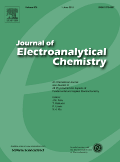
Journal of Electroanalytical Chemistry
Scope & Guideline
Exploring New Horizons in Electroanalytical Methodologies
Introduction
Aims and Scopes
- Electrochemical Energy Storage:
Research on novel materials and methods for lithium-ion, sodium-ion, and other energy storage systems, including batteries and supercapacitors. - Electrochemical Sensors:
Development and optimization of electrochemical sensors for detecting various analytes, including drugs, environmental pollutants, and biomarkers. - Electrocatalysis:
Studies focused on electrocatalytic materials and processes for energy conversion applications, particularly in fuel cells and water splitting. - Environmental Electrochemistry:
Research addressing the electrochemical treatment of pollutants, waste management, and the development of sustainable electrochemical processes. - Fundamental Electrochemical Studies:
Theoretical and experimental investigations into the mechanisms of electrochemical reactions, including surface interactions and mass transport phenomena. - Nanomaterials in Electrochemistry:
Exploration of nanostructured materials and their applications in enhancing electrochemical performance across various systems.
Trending and Emerging
- Sustainable and Green Chemistry:
Research focused on environmentally friendly electrochemical processes and materials, including the development of biodegradable sensors and sustainable energy storage solutions. - Hybrid Energy Storage Systems:
The integration of different energy storage technologies, such as supercapacitors and batteries, is gaining traction, leading to innovative designs like hybrid supercapacitors. - Advanced Electrocatalysts for Energy Conversion:
A surge in studies on novel electrocatalysts that facilitate efficient energy conversion processes, particularly for hydrogen production and CO2 reduction. - Biomimetic and Bio-Inspired Electrochemistry:
Emerging interest in biomimetic systems and bio-inspired materials that replicate natural processes for applications in sensing and energy conversion. - Machine Learning and AI in Electrochemistry:
The application of machine learning and artificial intelligence techniques to enhance the understanding of electrochemical processes and improve sensor design. - Electrochemical Biosensors:
A growing focus on electrochemical biosensors that leverage advanced materials and nanotechnology for sensitive and selective detection of biomarkers.
Declining or Waning
- Traditional Electrode Materials:
There has been a noticeable decline in research focused on conventional electrode materials, as researchers shift towards innovative nanomaterials and composites that offer superior performance. - Basic Electrochemical Theory:
While foundational theories remain important, the focus on basic electrochemical principles without application to novel technologies has decreased, with more emphasis now placed on practical applications and advancements. - Single Sensor Applications:
The trend of developing standalone sensors for single analytes is waning, as there is a growing preference for multiplexed or integrated sensing systems that can detect multiple analytes simultaneously. - Conventional Corrosion Studies:
Research specifically focused on traditional corrosion mechanisms has become less frequent, as more interdisciplinary approaches integrating electrochemistry with materials science are being favored.
Similar Journals

Electrochemical Science Advances
Pioneering Discoveries in Electrochemical ResearchElectrochemical Science Advances, published by WILEY, is an esteemed Open Access journal that has been making significant contributions to the field of electrochemistry since its inception in 2021. With an ISSN of 2698-5977, this journal serves as a vital platform for researchers and practitioners looking to disseminate their findings on a diverse range of topics within the electrochemical sciences and related areas. The journal has achieved commendable rankings in the Scopus database, placing it in the 2nd quartile in Chemistry (miscellaneous) and the 3rd quartile in Electrochemistry, highlighting its relevance and growing influence in the academic community. As it converges from 2021 to 2024, Electrochemical Science Advances aims to foster collaboration and innovation, offering a vital resource for students, professionals, and researchers dedicated to advancing knowledge and technology in electrochemistry. Access to this cutting-edge research is straightforward, allowing for a comprehensive engagement with the latest advances in the field.

Portugaliae Electrochimica Acta
Pioneering Research in Electrochemistry Since 2008Portugaliae Electrochimica Acta is a distinguished journal dedicated to the field of electrochemistry, published by the SOCIEDADE PORTUGUESA ELECTROQUIMICA. With a notable ISSN of 0872-1904, this journal serves as a vital resource for researchers, professionals, and students interested in advancing their understanding of electrochemical processes. Though it is currently categorized in Q4 in the 2023 Electrochemistry rankings, the journal contributes significantly to the academic discourse from its base in Coimbra, Portugal. The journal's timeline spans actively from 2008 to 2025, ensuring a sustained engagement with emerging research. While the journal does not offer open access options, it remains an authoritative source noted for promoting innovative electrochemical research and fostering academic connections within the discipline. Researchers are encouraged to submit their findings and explore the latest contributions to this expanding field.
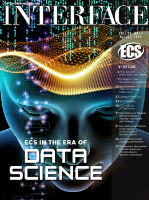
Electrochemical Society Interface
Illuminating the Path of Electrochemical ProgressElectrochemical Society Interface is a prominent journal within the field of electrochemistry, published by the Electrochemical Society Inc. The journal, carrying the ISSN 1064-8208 and E-ISSN 1944-8783, serves as a vital platform for researchers, professionals, and students alike, aiming to bridge the gap between cutting-edge research and practical applications in the electrochemical domain. With a convergence period spanning from 1992 to 2024, the journal enjoys a respectable ranking in the Q3 Quartile of the 2023 Electrochemistry category. Although it does not currently offer open access options, its articles provide valuable insights into various aspects of electrochemical research and technology, enhancing the scholarly communication in this important field. By maintaining high standards in research dissemination, Electrochemical Society Interface continues to foster innovation and contributes significantly to the developments in electrochemical processes and materials.
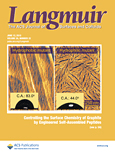
LANGMUIR
Unveiling Cutting-Edge Research in Materials and ElectrochemistryLANGMUIR is a prominent peer-reviewed journal published by the American Chemical Society, serving as a vital platform for research in various fields, including condensed matter physics, materials science, electrochemistry, and spectroscopy. With an ISSN of 0743-7463 and an E-ISSN of 1520-5827, this journal has established itself as a reputable source of cutting-edge scientific findings since its inception in 1985. Recognized for its rigorous academic standards, LANGMUIR holds significant ranking positions, including Q1 in condensed matter physics and spectroscopy, and Q2 categories in electrochemistry and materials science, reflecting its impactful contributions to these disciplines. Although the journal does not currently offer open access, it continues to foster collaboration and discussion among researchers by publishing high-quality articles that explore the frontiers of chemistry and physics. By engaging with LANGMUIR, readers can stay informed about the latest advances in surface and interface science, making it an essential resource for professionals, researchers, and students dedicated to these fields.
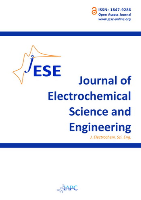
Journal of Electrochemical Science and Engineering
Connecting Researchers to the Future of Electrochemical Applications.The Journal of Electrochemical Science and Engineering, published by the International Association of Physical Chemists (IAPC), serves as a vital resource for researchers and professionals in the fields of electrochemistry, materials chemistry, and chemical engineering. With an Open Access model since 2011, this journal ensures that groundbreaking research is freely accessible to a global audience, promoting collaboration and knowledge sharing. Situated in Croatia, it showcases cutting-edge developments while focusing on applied aspects related to electrochemical technologies. Notably, the journal holds a commendable Scopus ranking, placing it within the Q3 quartile for multiple categories, including Chemical Engineering (miscellaneous) and Electrochemistry. By fostering innovative research and comprehensive reviews, the Journal of Electrochemical Science and Engineering plays a crucial role in advancing the understanding and application of electrochemical processes, making it an indispensable platform for academics and practitioners alike.

Applied Chemistry for Engineering
Advancing Knowledge for Real-World ApplicationsApplied Chemistry for Engineering, published by the Korean Society of Industrial and Engineering Chemistry, is a vital resource for researchers and professionals engaged in the realms of chemical engineering and applied chemistry. With an ISSN of 1225-0112 and an E-ISSN of 1228-4505, this journal serves as a platform for innovative research that spans diverse applications within these fields. Although currently not classified under open access, it provides critical insights and advancements to its audience, contributing to the ongoing discourse in the industry. The journal's significance is underscored by its rankings in Scopus, where it resides in the Q4 category for both Chemical Engineering and Chemistry, evidencing its commitment to publishing relevant studies despite its emerging status. As it continues to grow through the converged years from 2007 to 2024, Applied Chemistry for Engineering aims to bridge the gap between theoretical research and practical engineering solutions, making it an essential tool for students, researchers, and professionals alike.

Journal of Electrochemical Science and Technology
Elevating Electrochemical Science for a Sustainable TomorrowJournal of Electrochemical Science and Technology, with the ISSN 2093-8551, is a distinguished publication in the field of electrochemistry, disseminated by the Korean Electrochemistry Society. Based in South Korea, the journal has made significant strides since its inception in 2014, showcasing groundbreaking research that spans various applications of electrochemical science. Currently ranked in the Q2 category for Electrochemistry, it occupies an emerging position within the academic community, evidenced by its Scopus rank of #25 out of 60 in the Electrochemistry domain, placing it in the 59th percentile. Although the journal follows a traditional access model, it remains committed to providing high-quality, peer-reviewed content that fuels innovation and scholarly dialogue. With objectives firmly rooted in advancing the understanding and application of electrochemical phenomena, this journal serves as a crucial resource for researchers, professionals, and students alike, striving to push the boundaries of the electrochemical sciences.

SURFACE ENGINEERING AND APPLIED ELECTROCHEMISTRY
Advancing Knowledge in Industrial Surface TechnologiesSURFACE ENGINEERING AND APPLIED ELECTROCHEMISTRY, published by PLEIADES PUBLISHING INC, stands as a pivotal resource in the realms of engineering and materials science. With an ISSN of 1068-3755 and an E-ISSN of 1934-8002, this journal encompasses an extensive scope that includes industrial applications, and innovative surface treatments, fostering advancements in the fields of Industrial and Manufacturing Engineering, Surfaces, Coatings and Films, and Surfaces and Interfaces. Recognized for its contributions, it currently holds a Q3 classification in both Industrial and Manufacturing Engineering and Surfaces, Coatings and Films, alongside a Q4 ranking in Surfaces and Interfaces for the year 2023. Despite its competitive standings, the journal encourages inclusive dialogue and dissemination of research from a global community—making it an essential platform for researchers and professionals dedicated to surface technologies and applied electrochemistry. Potential contributors and readers can expect a comprehensive exploration of techniques and innovations, reinforcing the journal's commitment to bridging theory and practical application in these dynamic fields.

International Journal of Electrochemical Science
Empowering researchers to shape the future of electrochemistry.International Journal of Electrochemical Science is a peer-reviewed journal dedicated to disseminating cutting-edge research in the field of electrochemistry. Published by Elsevier in Serbia, this journal serves as a vital platform for scientists and researchers to explore innovative electrochemical techniques, processes, and applications. With an ISSN of 1452-3981, it has been a respected source of scholarly articles since its inception in 2006 and continues to bridge the gap between theoretical advancements and practical implementations up until 2024. Notably, it holds a Q4 quartile ranking in the field of electrochemistry and ranks 41 out of 60 in the Scopus database, situating it within the 32nd percentile among its peers. The journal champions open academic discourse, contributing significantly to the advancement of knowledge in electrochemical sciences, making it an essential resource for researchers, professionals, and students alike who are striving towards new discoveries and innovations.
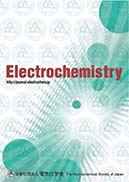
ELECTROCHEMISTRY
Connecting Global Minds in Electrochemical TechnologyELECTROCHEMISTRY is an esteemed journal published by the Electrochemical Society of Japan, dedicated to advancing the field of electrochemical science and technology. With an ISSN of 1344-3542 and an E-ISSN of 2186-2451, this journal has been providing a platform for scholarly communication since its inception in 1996, with a converged scope extending to 2024. As an Open Access publication since 2020, it facilitates the wide dissemination of research, fostering collaboration among researchers, professionals, and students alike. Currently positioned in Q3 of the electrochemistry category and ranking 52 out of 60 in Scopus, ELECTROCHEMISTRY is committed to publishing high-quality, peer-reviewed articles that explore novel electrochemical systems, applications, and methodologies. With its base in Tokyo, Japan, the journal serves a global audience, promoting cutting-edge research that drives innovation in energy, materials science, and analytical chemistry.